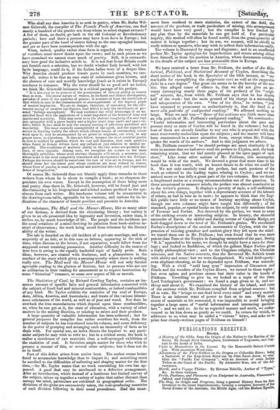We have received a letter from Mr. Pridham, the author
of An His- torical, Political, and Statistical Account of Ceylon, describing the short notice of hie book in the Spectator of the 10th instant, as "re. markable for exemplifying the suppressio veri as well as the suggestio falsi in a rare degree." Our great sin seems to be the brevity of the no- tice. One alleged cause of offence is, that we did not give an ac. count (occupying nearly three pages of his preface) of the "origi- nal" sources, &c., from which Mr. Pridham says that he has drawn half of the work: but the main ground of his charge is a misreading and misquotation of his own. "One of the dicta," he writes, "you have ventured to pronounce so authoritatively is, that the book is a mere olla podrida of undigested reading." We affirmed nothing so large. What we said was—" Some of his sections are little more than an olla podrida of Mr. Pridham's undigested reading." We continued- " Useful information and interesting particulars about the past and present story or state of Ceylon will be found in the volumes ; but the best of them are already familiar to any one who is acquainted with the most trustworthy authorities upon the subjects ; and the matter will have been encountered in a more attractive form, except when Mr. Pridham quotes the words of his authors." And to dlis judgment we adhere.
Mr. Pridham conceives " he should perhaps act most charitably if he were to assume that we had never read the pretkce to Ceylon, and, the book remaining uncut, that we had merely glanced at the open pages of each sheet." Like some other notions of Mr. Pridham, this assumption would be wide of the mark. We devoted a great deal more time to his book than it was worth, with an honest desire to do what we could for it. We not only carefully read the preface, but such portions of the work as referred to the leading topics relating to Ceylon ; and we ex- amiued more or less fully a great part of the two volumes. But we found a lengthened notice or a strong recommendation out of the question. To those accustomed to measure minds, the preface was almost conclusive as to the writer's powers. It displays a poverty of style, a self-sufficiency about his own doings, together with a depreciatory account of the labours of others, as bad in tone as in taste ; he appears to think that the Eng- lish public have little or• no means of learning anything about Ceylon, though our own columns might have taught him differently.; of the standard, popular, or specialbooks on the subject, he only mentions those of Tumour and Forbes. Not deterred by the preface, we went to some of the striking events or interesting subjects. In history, the shameful surrender of Davie, the skilful and daring retreat of Captain Madge, are both dragged down to the level of Mr. Pridnam's genius. We recollected Forbes's descriptions of the ancient monuments of Ceylon, with the im- pression of existing grandeur and ancient glory they left upon the mind: we traced them out in Mr. Pridham ; but soon found that he was more potent than Time or the Tropics in damaging memorials of the past. Seeing "B.A." appended to his name, we thought he might have a turn for theo- logy; and looked to Buddhism, of which the gallant Major Forbes gives a really philosophical view ; and to the Cingalese religion, the Christian missions, and the Native converts, that the Reverend Mr. Selkirk treats with ability and sense : but we were disappointed. We tried field-sports : even elephant-shooting, so far as depended upon Pridham, was unexcit- ing. With a vivid " auld lang sync" impression of Cinnamon and Pearls and the wonders of the Ceylon divers, we turned to those topics : but even spices and precious stones lost their value in the hands of Pridham. Unwilling to give in, we looked to a topic of the time, Lord Torrington's government : we found a page given to it, and no- thing said about it. We examined the history of the island, and some of the sections which Mr. Pridham compiled from original sources : but all in vain. He " brings to one dead level every mind' and every matter. There is an inherent want of power to fuse or to use. With such stores of materials at his command, it was impossible to avoid bringing together a large mass of "useful information and interesting ‘partica- lars " : and we said so. As far as regarded manner and merit, we endea- voured to let him down as gently as we could. In return for which, he addresses to us what may be called a " vicious " letter, and asks us to print four closely-written pages of Pridham on himself !


























 Previous page
Previous page